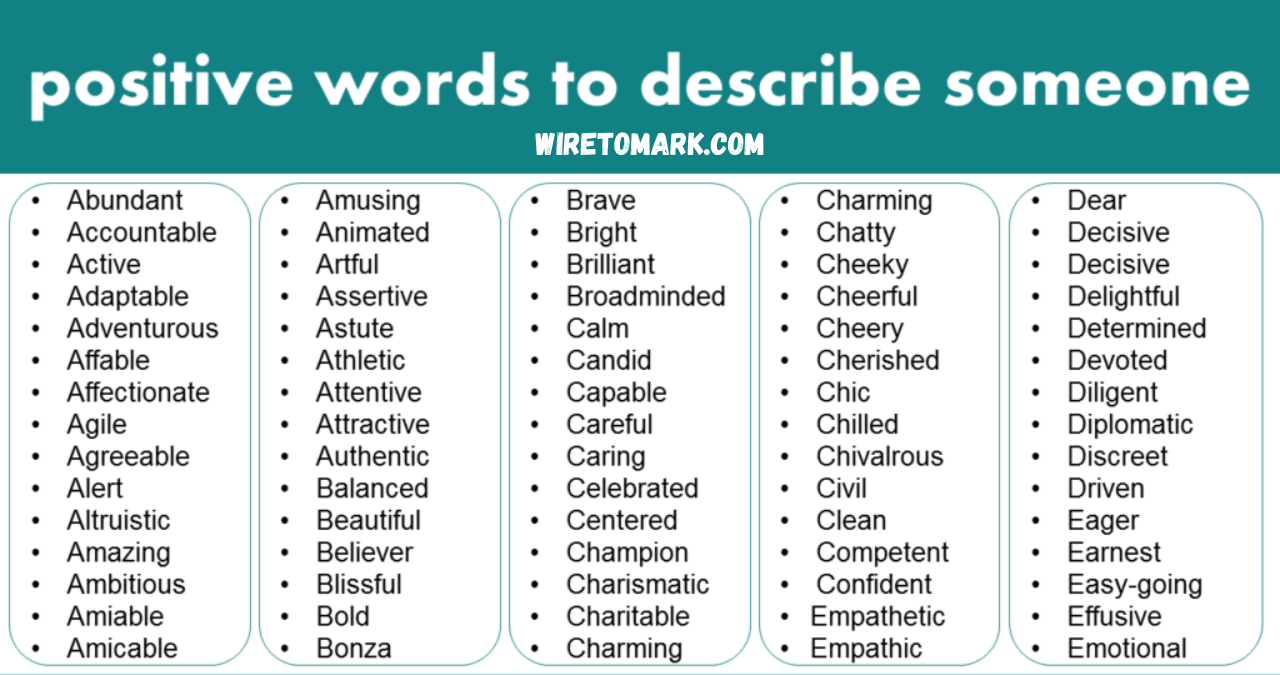Language has a way of shaping how we see the world, and one of the most powerful tools in our vocabulary is positive adjectives. These words not only add color and depth to our conversations but also create a sense of encouragement and optimism. When we describe something or someone using uplifting words, we don’t just share information—we share energy. The right phrase at the right time can completely shift the way people perceive themselves, their tasks, or even an ordinary day.
Positive adjectives are more than just simple descriptors; they are emotional triggers. When used thoughtfully, they can improve relationships, boost confidence, and create an atmosphere of warmth and respect. Whether you’re writing, speaking, or even thinking, the words you choose matter. By leaning toward positivity, you craft a brighter world for yourself and those around you.
Why Positive Adjectives Matter in Communication
When it comes to communication, words hold more weight than many of us realize. Using positive adjectives can transform the tone of a conversation, making it feel more welcoming and engaging. Imagine being called “dedicated” rather than just “hardworking”—the emotional impact of the former leaves a stronger, kinder impression. Choosing uplifting language helps build stronger connections and keeps conversations free of unnecessary negativity.
In professional settings, the choice of descriptive words plays a critical role as well. Complimenting a colleague as “insightful” or “talented” not only acknowledges their skills but also boosts morale. Such words encourage teamwork, collaboration, and respect. In personal life, too, using warm and supportive terms makes others feel valued and appreciated. It’s a small adjustment with a big impact.
The Emotional Influence of Positive Adjectives
The way positive adjectives affect emotions is fascinating. They carry the power to encourage, heal, and inspire. When you describe someone as “kind” or “brilliant,” you’re not just labeling them—you’re affirming their worth and abilities. These affirmations can have lasting effects, motivating people to keep pushing forward and to view themselves more positively.
Even in self-talk, using encouraging language has benefits. Telling yourself that you are “capable,” “resilient,” or “creative” rewires your mindset to focus on strengths rather than weaknesses. Over time, this type of self-encouragement builds resilience against stress and negativity, creating a healthier outlook on life.
Building Stronger Relationships with Uplifting Language
Positive adjectives are like bridges in relationships—they connect people with warmth and respect. When you compliment a friend by calling them “thoughtful” or “supportive,” you’re doing more than giving praise; you’re reinforcing your bond. Such words let others know that their efforts and personalities are seen and appreciated, which strengthens mutual trust.
This type of communication also works wonders in romantic relationships. A partner who hears they are “caring” or “wonderful” feels reassured and secure. Over time, regularly using uplifting descriptors creates an atmosphere of love and appreciation that no grand gesture could replace. Words, though free, become priceless when chosen wisely.
Positive Adjectives in Professional Growth

Career development is not just about skills and qualifications; it’s also about perception. Positive adjectives help create a professional image that stands out. Describing yourself as “adaptable” or “motivated” in a resume, for example, makes a stronger impression than using flat, neutral terms. These descriptors show employers that you bring not only competence but also enthusiasm.
Beyond resumes, workplace interactions benefit from encouraging language. A manager who calls a team “innovative” inspires confidence, while a leader who describes efforts as “exceptional” motivates continued excellence. Professional environments thrive on positivity, and language sets the tone for that culture.
Writing That Sparkles with Positive Adjectives
Writers of all kinds, from authors to marketers, understand the magic of descriptive language. Positive adjectives are particularly useful when creating content meant to inspire, persuade, or entertain. Describing a product as “reliable” or “outstanding” paints a vivid picture for the reader, making them more likely to trust and engage with the message.
In storytelling, uplifting language builds characters readers admire and settings that feel alive. Readers connect more deeply with a “graceful” dancer or a “brilliant” inventor than with characters described in plain, lifeless terms. The beauty of these words lies in their ability to make ideas shine brighter.
Positive Adjectives and Self-Expression
Self-expression is at its best when it’s authentic and encouraging. Positive adjectives allow people to describe themselves in ways that highlight strengths without arrogance. Calling yourself “passionate” or “driven” communicates both competence and positivity. It’s an empowering way to frame personal identity.
For artists, creators, and entrepreneurs, these uplifting descriptors help them showcase their work in a way that resonates. A photographer who is “imaginative” or a teacher who is “dedicated” builds a strong personal brand. Self-expression becomes not just about what you do, but about the positive qualities you bring to the table.
The Role of Positive Adjectives in Education
Educators know the value of encouragement, and language plays a central role in it. When a teacher calls a student “bright” or “curious,” it validates their efforts and sparks greater motivation. These words can make students feel capable of achieving more than they thought possible.
Classroom environments that focus on uplifting language also encourage collaboration. Students who hear they are “creative” or “helpful” are more likely to participate actively and support their peers. Positive adjectives become tools of empowerment, shaping both academic growth and personal confidence.
Everyday Benefits of Positive Adjectives
In daily life, the small moments often matter the most. Using positive adjectives when greeting someone—calling them “wonderful” or “amazing”—can brighten their entire day. It’s a reminder that kindness doesn’t always need grand gestures; sometimes, it’s simply about words.
These uplifting terms also help in managing stress. When we reframe situations using encouraging descriptors, like saying a challenge is “manageable” instead of “difficult,” our mindset shifts. This subtle change in vocabulary influences how we handle obstacles, making us more resilient and optimistic.
How to Practice Using Positive Adjectives
Like any habit, the use of positive adjectives takes practice. Start by paying attention to your word choices during conversations. Instead of saying someone did a “good” job, try calling their work “fantastic” or “impressive.” Small shifts like these build up over time, creating a more positive communication style.
Journaling is another effective way to practice. Write about your day using uplifting language, focusing on what went “great” instead of what went wrong. Over time, this trains your brain to lean toward positivity, making it easier to use encouraging words naturally in all areas of life.
Conclusion
Words shape our reality, and positive adjectives are among the most powerful tools we can use to make life brighter. They influence how we see ourselves, how others see us, and how we connect with the world. From professional settings to personal relationships, uplifting language builds trust, confidence, and joy.



